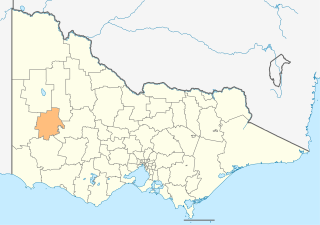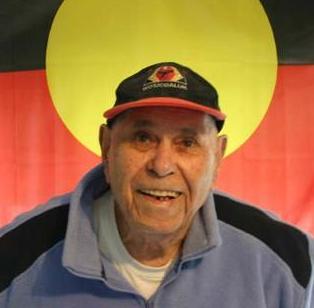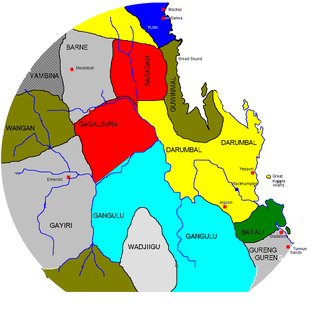
Wik Peoples v The State of Queensland is a decision of the High Court of Australia delivered on 23 December 1996 on whether statutory leases extinguish native title rights. The court found that the statutory pastoral leases under consideration by the court did not bestow rights of exclusive possession on the leaseholder. As a result, native title rights could co-exist depending on the terms and nature of the particular pastoral lease. Where there was a conflict of rights, the rights under the pastoral lease would extinguish the remaining native title rights.

The Rural City of Horsham is a local government area in Victoria, Australia, located in the western part of the state. It covers an area of 4,267 square kilometres (1,647 sq mi) and, in June 2018, had a population of 19,875. It includes the towns of Brimpaen, Dadswells Bridge, Dooen, Haven, Horsham, Laharum, Natimuk, Noradjuha and Pimpinio. It was formed in 1995 by the amalgamation of the City of Horsham, most of the Shire of Wimmera and Shire of Arapiles, and part of the Shire of Kowree.

The Shire of Buloke is a local government area in Victoria, Australia, located in the western part of the state. It covers an area of 8,000 square kilometres (3,100 sq mi) and, in June 2018, had a population of 6,184. It includes the towns of Birchip, Charlton, Donald, Sea Lake and Wycheproof. It was formed in 1995 from the amalgamation of the Shire of Wycheproof, Shire of Birchip, Shire of Charlton, Shire of Donald, and parts of the Shire of Kara Kara.

Nhill is a town in the Wimmera, in western Victoria, Australia. Nhill is located on the Western Highway, halfway between Adelaide and Melbourne. At the 2016 census, Nhill had a population of 1,749. "Nhill" is believed to be a Wergaia word meaning "early morning mist rising over water" or "white mist rising from the water".
Native title is the designation given to the common law doctrine of Aboriginal title in Australia, which is the recognition by Australian law that Indigenous Australians have rights and interests to their land that derive from their traditional laws and customs. The concept recognises that in certain cases there was and is a continued beneficial legal interest in land held by Indigenous peoples which survived the acquisition of radical title to the land by the Crown at the time of sovereignty. Native title can co-exist with non-Aboriginal proprietary rights and in some cases different Aboriginal groups can exercise their native title over the same land.

The Wonnarua people, otherwise written Wanarruwa, are a group of Aboriginal Australian people united by strong ties of kinship, and who survived in family groups or clans scattered along the inland area of what is now known as the Upper Hunter Valley, New South Wales, Australia. Their creation spirit is Baiami, also known as Koin, the creator of all things and the Keeper of the Valley.
Kaniva is a town in Victoria, Australia. It is located on the Western Highway, north of Little Desert National Park, in the Shire of West Wimmera local government area. It is located roughly 25 kilometres (16 mi) east of the South Australian border and 43 kilometres (27 mi) east of Bordertown. At the 2016 census, Kaniva had a population of 803. The town is commonly used as a rest point for those travelling between Melbourne and Adelaide. The Kaniva region has some rare flora and fauna. The rare south-eastern red-tailed black cockatoo is found in the region. The Shire of West Wimmera prohibits the felling of dead trees to ensure that they have adequate nesting sites.

The Native Title Act 1993 (NTA) is a law passed by the Australian Parliament, the purpose of which is "to provide a national system for the recognition and protection of native title and for its co-existence with the national land management system". The Act was passed by the Keating Government following the High Court's decision in Mabo v Queensland (1992). The Act commenced operation on 1 January 1994.

The Yorta Yorta, also known as Jotijota, are an Aboriginal Australian people who have traditionally inhabited the area surrounding the junction of the Goulburn and Murray Rivers in present-day north-eastern Victoria and southern New South Wales.

Yarmirr v Northern Territory, that was an application for the determination of native title to seas, sea-bed and sub-soil, ultimately determined on appeal to the High Court of Australia.

Catherine Margaret Branson is a former Australian judge and public servant. She was a judge of the Federal Court of Australia from 1994 to 2008, and then President of the Australian Human Rights Commission from 2008 to 2012.
The Jardwadjali (Yartwatjali), also known as the Jaadwa, are an Aboriginal Australian people of the state of Victoria, whose traditional lands occupy the lands in the upper Wimmera River watershed east to Gariwerd (Grampians) and west to Lake Bringalbert.

William John Kennedy (1919–2005), better known as Uncle Jack Kennedy, was a lifelong activist for the rights of Australian Aboriginal people, a Wotjobaluk clan elder of the people who spoke the Wergaia language in the Wimmera region of western Victoria, Australia. He was born on 23 March 1919 on the banks of the Wimmera River, not far from the Ebenezer Mission and died on 6 September 2005. He was the great grandson of Dick-a-Dick, a member of the first Australian cricket team to tour England in 1867–68.
The Wergaia or Werrigia people are an Aboriginal Australian group in the Mallee and Wimmera regions of north-Western Victoria, made up of a number of clans. The people were also known as the Maligundidj which means the people belonging to the mali (mallee) eucalypt bushland which covers much of their territory.

Yorta Yorta v Victoria was a native title claim by the Yorta Yorta, an Aboriginal Australian people of north central Victoria. The claim was dismissed by Justice Olney of the Federal Court of Australia in 1998. Appeals to the Full Bench of the Federal Court of Australia in 2001 and the High Court of Australia in 2002 were also dismissed.
Howard William Olney AM QC is the Australian Aboriginal Lands Commissioner.

Wergaia or Werrigia is an Australian Aboriginal language in the Wimmera region of north-Western Victoria. The Wergaia language consisted of four distinct dialects: Wudjubalug/Wotjobaluk, Djadjala/Djadjali, Buibadjali, Biwadjali. Wergaia was in turn apparently a dialect of the Wemba Wemba language, a member of the Kulinic branch of Pama–Nyungan.

The Baranha or Barna, also known as Barada Barna, are an Australian Aboriginal people of northern Queensland.

The Barengi Gadjin Land Council was formed in 2005 to represent the Wotjobaluk, Jardwadjali, Wergaia and Jupagalk peoples. The Council manages native title rights across Western Victoria in an area "roughly described as the Wimmera River from the head of the Yarriambiack Creek through to Outlet Creek at the northern end of Lake Albacutya". The Council is governed by a board of directors representing various family groups and has offices in Wail and Horsham. The current chairperson is Dylan Clark.









